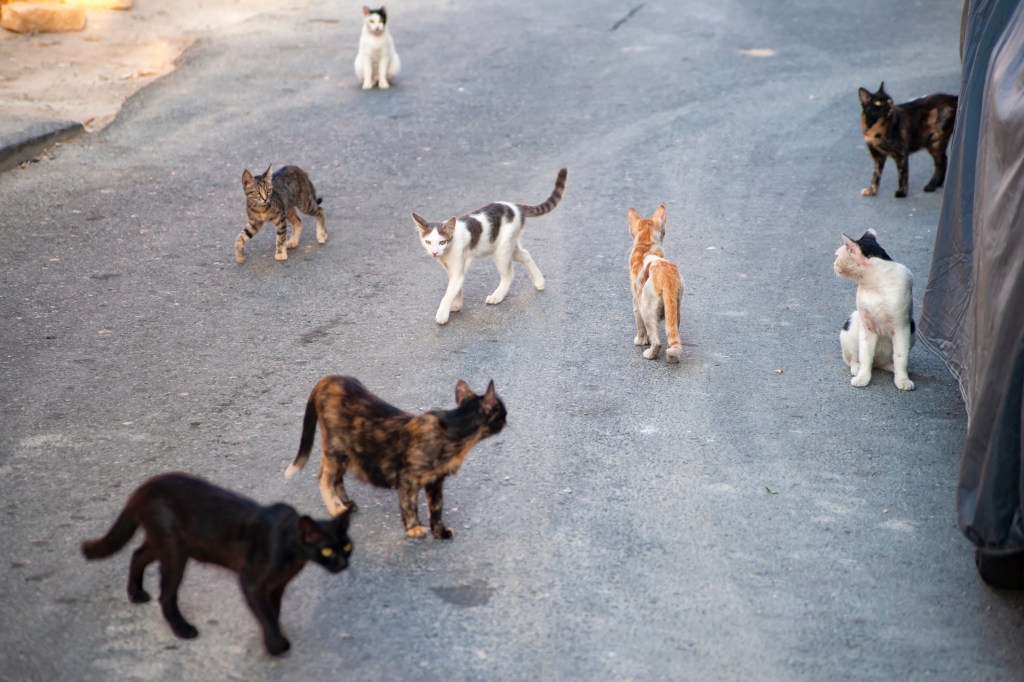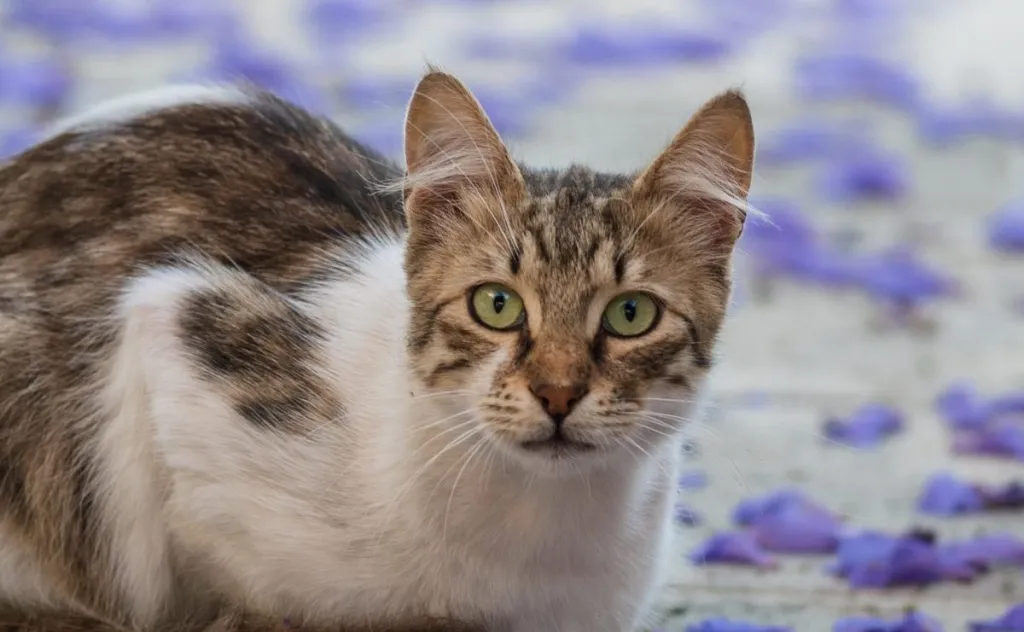The Cyprus cat, commonly called the Saint Helen Cat, Saint Nicholas Cat, Aphrodite Giant, or Aphrodite Cat, is a feline native to the sun-soaked landscapes of the Mediterranean island from which they take their name. A unique cat breed with an antiquity-steeped history, these cats have become an integral part of Cyprus’s cultural tapestry. Their resilient spirit and adaptability have allowed them to thrive in the island’s diverse environment through the ages.
Characterized by a lean and medium-sized frame, a coat that can be short or long, almond-shaped eyes, and bushy tails, Cyprus cats possess distinctive physical traits that set them apart. Beyond their appearance, Cyprus cats have a friendly and intelligent temperament. Forming close bonds with their human companions, these cats have played historical roles as guardians against rodents in homes, grain stores, and ships. In comparison to the Aegean cat, these Mediterranean natives are typically more athletic and energetic.
When considering a Cyprus cat, it’s advisable to prioritize adopting from rescue organizations or shelters to provide a loving home to a cat in need. However, if you decide to purchase a Cyprus kitten, it’s crucial to choose a reputable breeder. Conduct thorough research to ensure that the breeder follows ethical practices and prioritizes the well-being of their cats. Reputable Cyprus cat breeders prioritize the health and temperament of their cats, conduct necessary health screenings, and provide a nurturing environment for the kitties. This active approach ensures that you bring home a healthy and happy kitty while discouraging unethical breeding practices.
Quick Facts
- Origin: Cyprus Island, with a lineage potentially stretching back over 5,000 years, considered one of the oldest cat breeds.
- Size: Slender and tall, medium (7-12 pounds), with an overall athletic build.
- Coat: Short or semi-longhaired, comes in a wide variety of colors and patterns, including solid, tabby, bi-color, tortoiseshell, and ticked.
- Temperament: Intelligent, playful, curious, adaptable, affectionate, enjoys human interaction and playtime.
- Exercise Needs: Moderate – they love exploring, climbing, and games, but can also adapt to quieter lifestyles.
- Training: Trainable with positive reinforcement due to their intelligence and desire to please.
- Grooming: Weekly brushing for short-haired, more frequent for semi-longhaired, to prevent matting.
- Health: Generally healthy, known for their longevity, but some potential for genetic health conditions
- They are also known as the Cypriot cat, Saint Helen cat, or the Aphrodite Giant.
- These cats are linked to a Byzantine Monastery that had a venomous snake problem, and used cats to rid the monastery of vermin.
- The earliest record of cat domestication exists on Cyprus, and about 9,500 years old.
- Unfortunately, a cat coronavirus devastated the population of cats on Cyprus, but leftover Covid medication is helping.
Cyprus Pictures



-
Affectionate with Family
Some cat breeds are typically independent and aloof, even if they’ve been raised by the same person since kittenhood; others bond closely to one person and are indifferent to everyone else; and some shower the whole family with affection. Breed isn’t the only factor that goes into affection levels; cats who were raised inside a home with people around feel more comfortable with humans and bond more easily.

See Cats Less Affectionate with Family -
Amount of Shedding
If you’re going to share your home with a cat, you’ll need to deal with some level of cat hair on your clothes and in your house. However, shedding does vary among the breeds. If you’re a neatnik, you’ll need to either pick a low-shedding breed or relax your standards. This furniture cover can make it easier to clean up cat hair and keep it off your sofa!
-
General Health
Due to poor breeding practices, some breeds are prone to certain genetic health problems. This doesn’t mean that every cat of that breed will develop those diseases; it just means that they’re at an increased risk. If you’re looking only for purebred cats or kittens, it’s a good idea to find out which genetic illnesses are common to the breed you’re interested in.
-
Potential for Playfulness
Some cats are perpetual kittens—full of energy and mischief—while others are more serious and sedate. Although a playful kitten sounds endearing, consider how many games of chase the mouse-toy you want to play each day, and whether you have kids or other animals who can stand in as playmates. A classic wand cat toy like this one is perfect for playful felines!
-
Tendency to Vocalize
Some breeds sound off more often than others with meows, yowls, and chattering. When choosing a breed, think about how the cat vocalizes and how often. If constant “conversation” drives you crazy, consider a kitty less likely to chat.
-
Kid-Friendly
Being tolerant of children, sturdy enough to handle the heavy-handed pets and hugs they can dish out, and having a nonchalant attitude toward running, screaming youngsters are all traits that make a kid-friendly cat. Our ratings are generalizations, and they’re not a guarantee of how any breed or individual cat will behave; cats from any breed can be good with children based on their past experiences and personality.
-
Friendly Toward Strangers
Stranger-friendly cats will greet guests with a curious glance or a playful approach; others are shy or indifferent, perhaps even hiding under furniture or skedaddling to another room. However, no matter what the breed, a cat who was exposed to lots of different types, ages, sizes, and shapes of people as a kitten will respond better to strangers as an adult.
-
Easy to Groom
Some breeds require very little in the way of grooming; others require regular brushing to stay clean and healthy. Consider whether you have the time and patience for a cat who needs daily brushing. You should definitely pick up this awesome de-shedding tool for cats of any hair length!
-
Intelligence
Some cat breeds are reputed to be smarter than others. But all cats, if deprived the mental stimulation they need, will make their own busy work. Interactive cat toys are a good way to give a cat a brain workout and keep them out of mischief. This scratcher cat toy can keep your smart kitty busy even when you’re not home!
-
Pet Friendly
Friendliness toward other household animals and friendliness toward humans are two completely different things. Some cats are more likely than others to be accepting of other pets in the home.
Cyprus History
According to feline lore, the Cyprus cat is an ancient breed that has been living in the mountains of the Mediterranean island of Cyprus for so long that they actually predate Egyptian cats by around 4,000 years!
Back in the 4th Century, the Cyprus cat breed was said to be imported to a Byzantine monastery in a bid to get on top of an infestation of snakes and vermin. Due to the breed’s history of originating from mountainous regions, it’s rare to see a Cyprus living closer to the water. These days, you may find the Cyprus in shelters or in the care of rescue groups. So make sure to consider adoption if you decide that this is the breed for you!
Cyprus Size
The Cyprus is a medium-sized cat. As is always the case, exact size standards might vary. Most Cyprus cats weigh between eight and 16 pounds, with the females often being smaller than the males.
Cyprus Personality
First of all, it’s important to note that the Cyprus cat is a very energetic breed of feline who needs to be kept active. This means regular play times with the humans in their life are a must, along with a living environment that is large enough to let the cat run around and explore. This is vital to ensure that the Cyprus gets their required daily exercise, which will help keep the cat happy and prevent them from becoming frustrated and possibly developing behavioral issues.
Adding a cat tree or other form of cat furniture to your home is an essential requirement for adopting a Cyprus. Beyond their athletic nature, the Cyprus is also a social feline who will usually enjoy being around the humans in their life; although, it should be mentioned that some accounts of living with a Cyprus have suggested that the breed sometimes does not enjoy being picked up or handled.
Cyprus Health
The Cyprus is generally considered to be a healthy cat; although, it’s important to schedule regular wellness visits with your cat’s vet. There aren’t any breed-specific health problems associated with the Cyprus, but always keep an eye out for signs that your cat might be in distress or pain.
Cyprus Care
As with all cats, it’s important to keep up your Cyprus’s regular veterinary checkups to detect any health concerns early. Your vet can help you develop a care routine that will keep your cat healthy.
Beyond scheduling yearly wellness visits with your vet, make sure that you pick up a scratching post for your Cyprus cat’s living environment. This can help promote healthy scratching and keep the cat’s nails in good condition, which is vital for such an energetic breed. The Cyprus’s ears should be examined regularly for signs of dirt building up or possible infection.
Talk to your vet about starting a regular teeth brushing regimen that will suit your Cyprus. Your vet can advise you about specific brands and techniques. Finally, the Cyprus will appreciate a cat tree to play and interact with. This will help keep the cat active and physically satisfied, so definitely consider adding one to your home!
Cyprus Coat Color And Grooming
The Cyprus is usually found sporting a coat with tabby patterns, but they’ve also been spotted in a range of colors. When it comes to grooming a Cyprus, brushing the cat once a week should suffice. This will help keep the feline’s coat in good condition and also ward off the chances of mats forming. Use the grooming time as an opportunity to bond with your cat.
In terms of climate, most Cyprus cats are fairly adaptable, a virtue credited to their hardy origin in the mountains. Just remember to always make sure that there’s enough shade and fresh water available during the hotter months.
Children And Other Pets
The Cyprus cat is normally a good fit for families with young kids. Just make sure that early socialization takes place and boundaries are properly set on both sides. Supervise early interactions between young children and cats.
When it comes to other household pets, the Cyprus is said to fare well with most other domestic animals. But always make sure to supervise early interactions between the new cat and existing pets. Sometimes these relationships are very much dependent on the individual pets’ personalities. Ultimately, early socialization really pays off with this breed. Make sure to reward your Cyprus for good behavior when you bring them home to your family!
Cyprus Rescue Groups
It may be hard to find a breed specific rescue for Cyprus cats because they are a somewhat uncommon breed in many parts of the world. However, you may want to try shelters and rescues that cater to all types of cats, including Cyprus cats, as well as your local shelter. Here are some nonprofit rescues you can try:
More Info For You
If you’re also looking for a dog, check out DogTime’s dog breed page!





